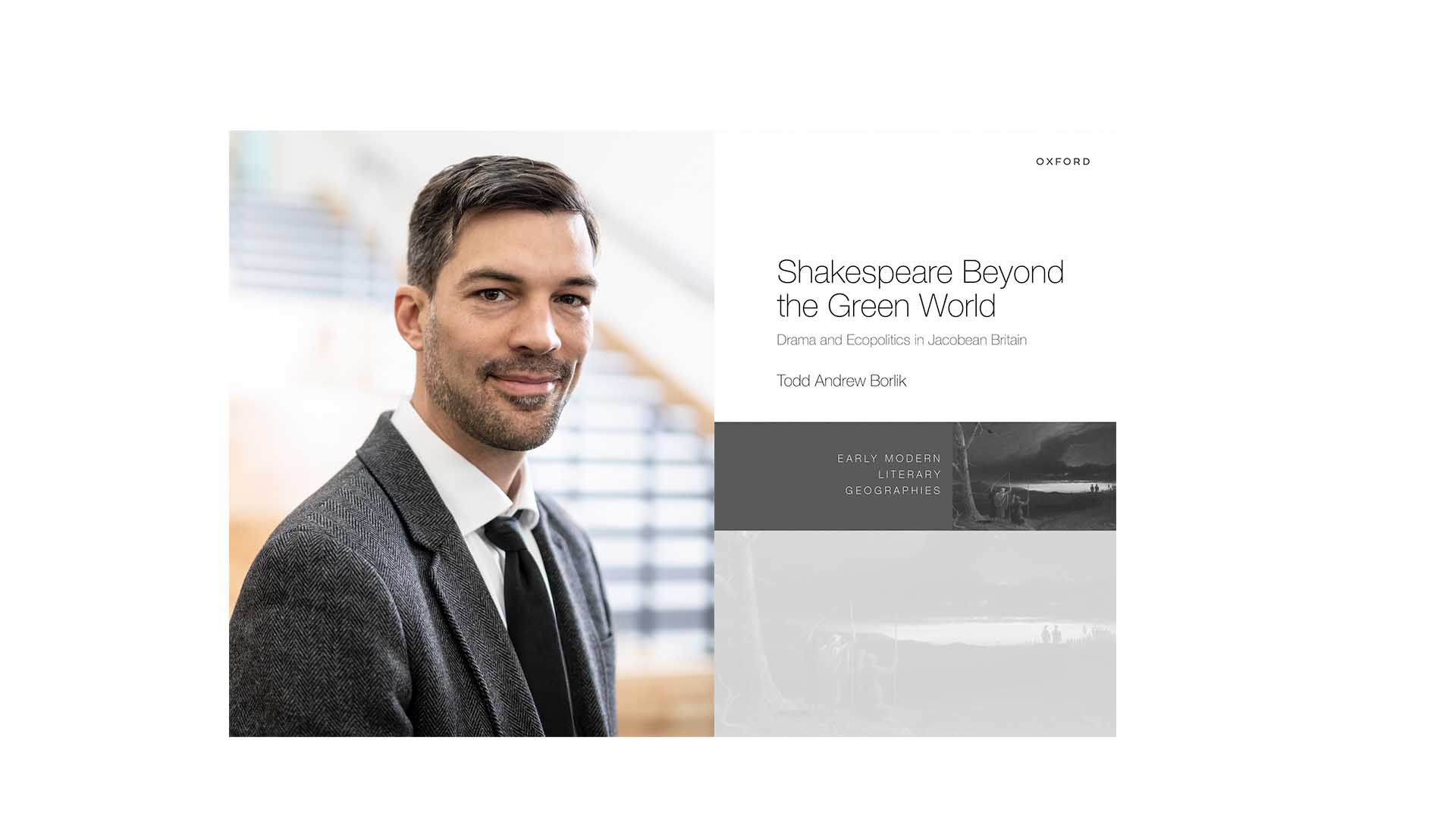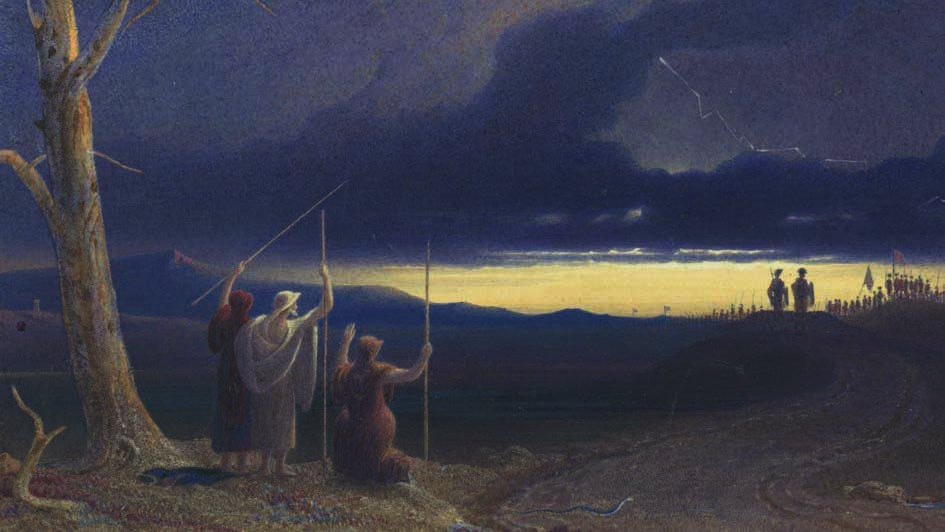A new book by the University of Huddersfield's Dr Todd Borlik proposes that William Shakespeare was making radical statements about ecopolitics and environmental issues in many of his later plays.
Dr Borlik's studies and research have been linking Shakespeare to environmental concerns of the 16th and 17th centuries for around 20 years. Now he has brought it together in Shakespeare Beyond the Green World - Drama and Ecopolitics in Jacobean Britain, published by Oxford University Press.
He states that aspects of many of Shakespeare's plays written after the accession of King James I to the throne in 1603 tackle issues like overfishing, mining, the fur trade, the draining of wetlands for agriculture and the use of land for hunting by the king that were causing both social upheaval and environmental degradation.
Dr Borlik says that Shakespeare's dialogue, plots and geographical settings in plays including Macbeth, Coriolanus, Cymbeline, and The Tempest reflected an unhappiness in the mass of the population at what was being imposed on them by the country's ruling classes.
The Tempest inspired by upheaval in rural eastern England
The book is a radical reinterpretation of some of the Bard's most famous works that addresses long-held preconceptions. The Tempest, said to be the last play written by Shakespeare alone, is generally held to be set on an island in the Mediterranean or is even an allegory of the conquest of the American continent, but for Dr Borlik it reflects something much closer to home from the time.

"The bombshell from that chapter is that The Tempest has been generally moored in the Caribbean, seen as Shakespeare's New World play about the discovery of the Americas and encounters with the indigenous population," he says.
"But in fact it has one foot very firmly planted in England, because at the time there was a very heated debate about the draining of The Fens, in the east of the country, and the destruction of these vast wetlands to convert them to arable land for agriculture.
Discover more about studying English Literature at the University of Huddersfield
"There was a lot of popular resistance to it in parliament and in The Fens, there were acts of sabotage and what we could categorise as eco-terrorism to prevent it. The character of Caliban, who I wrote about in 2012, represents some of that animosity of the local population, but he is also a personification of Fen Demons that would curse interlopers who meddled with The Fens.
"It is a complete reorientation of our understanding of The Tempest as a play about exotic far-off lands, suggesting that there were pockets of wilderness in England's own backyard."
Shakespeare reflects civic unrest
For Dr Borlik, Reader in Renaissance Literature, Shakespeare's subtexts speak of ripples of civic unrest at what was being imposed on the population. Coriolanus, for instance, speaks to outrage over grain-hoarding but also government efforts to fight urban overcrowding by sending colonists to Ulster.
There is a more domineering and extractive agrarian capitalism that is being pushed from the centre to the periphery, and it is interfering with the local cottage economies. It is an attempt to increase production and wrench more money out of the land at the expense of local communities and wildlife. The enclosure movement is the best-known example of that, the appropriation of lands and trying to privatise everything.
Dr Todd Borlik, author of Shakespeare Beyond the Green World
One of Shakespeare's most famous stage directions – 'Exit, pursued by a bear', from The Winter's Tale – is also under the spotlight. Polar bears had been captured and presented to King James I and it is possible that an actor playing the unfortunate Antigonus, about to meet an untimely and unseen end, may have been chased off stage by a very real bear or possibly an actor in bear skin.
But Dr Borlik says that the same play strangely humanizes animals hunted for furs worn by the ruling classes.
Hermione is not what you think
"One of the most exciting discoveries in the book is that we have been mis-pronouncing the name of Hermione for 400 years! Hermione is the queen in The Winter's Tale, who is described as Russian, from the snowy north. Scanning the meter shows her name must have been disyllabic. They dropped h's in that time, so Hermione would have sounded like 'ermion', which is another name for the ermine.
"An ermine is a stoat in its white winter coat, a luxury fur that at the time only royalty could wear. Ermine fur was a symbol of royalty and chastity as well. When the queen is accused of adultery, she is stripped of her white furs, so her trial scene re-enacts the skinning of an animal. It changes our perceptions of the play if you view the queen as an ermine, and the scene where she or her statue is brought back to life captures a fascination with the new, death-defying art of taxidermy."
The 'blasted heath' where Macbeth meets the witches that will change his life, and the heath that features in some of King Lear's key scenes are both further examples of Shakespeare's interest in the natural world. In part they both reflect the interests of his patron King James, who was a keen hunter and outdoorsman.
 George Fennell Robson's depiction of Macbeth and Banquo on the 'blasted heath'
George Fennell Robson's depiction of Macbeth and Banquo on the 'blasted heath' "I make an argument that the king was fond of heaths, he built palaces alongside them and hunted on them," Dr Borlik adds. "But heaths were also allegedly hotbeds for witchcraft, another of James' obsessions. Macbeth reflects the controversy over how heathlands should be managed, should they should be preserved for animals as James liked to hunt, or were they cursed wastelands that needed to be scorched and manured to turn them into farmland? Hence this sinister depiction of them as blasted.
"Macbeth, King Lear, and Pericles are examples of Shakespeare sending his characters out into the wilderness to have an epiphany or realisation about the arrogance and puniness of humans. Shakespeare uses kingship as a metaphor for human control of the environment. When the kings have their come-uppance out in the wilds and learn the earth doesn't exist to cater to them, his plays are teaching us all to relinquish the delusion that we are entitled to dominate the planet."






